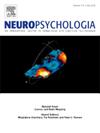Impact of immersive virtual reality compared to a digital static approach in word (re)learning in post-stroke aphasia and neurotypical adults: Lexical-semantic effects?
IF 2
3区 心理学
Q3 BEHAVIORAL SCIENCES
引用次数: 0
Abstract
Background
Word production difficulty is one of the most common and persisting symptoms in people suffering from aphasia (i.e., anomia). However, there is a considerable variability in patients’ responses to treatment, leading to the need of new effective approaches. Also, the mechanisms underlying word (re)learning is little known in production even in neurotypical adult native language and especially in relationship with the lexical-semantic integration of (re)learnt words. The lexical-semantic network being highly contextual and multimodal, new technologies such as immersive virtual reality (iVR) may become pertinent approaches, but still need scientific proof, especially as past studies have found no advantage over a control method and have never used an immersive version of VR. Yet, the immersion has been identified as being a key factor of positive outcomes in learning. Therefore, the aim of the present study was to investigate whether iVR provides a benefit in word learning in neurotypical adults (Study 1) and in the treatment for anomia in people suffering from aphasia following stroke (Study 2).
Method
In study 1, 32 neurotypical adults learned two matched lists of 30 rare words each in their native language (French) during a one-week protocol alternating test and learning sessions with iVR and a digital static learning method. Study 2 followed the same design over a two week-period with 16 people with aphasia (re)learning two matched lists of 28 frequent words.
Results
Neurotypical adults demonstrated a higher accuracy rate in word production for words learned with iVR in comparison to those learned with the digital static learning method. For people suffering from anomia, the iVR did not differ from the control method on total accuracy but led to a greater reduction of lexical errors.
Conclusion
iVR has a potential of use for learning new words but also for the treatment of word production difficulties, especially in people with aphasia that produce mainly lexical errors. These two main results lead to the hypothesis that iVR promotes lexical-semantic processes.
与数字静态方法相比,沉浸式虚拟现实对中风后失语症和神经正常成人单词(再)学习的影响:词汇-语义效应?
背景:单词生成困难是失语症(即失语症)患者最常见和持续的症状之一。然而,患者对治疗的反应存在相当大的差异,因此需要新的有效方法。此外,即使在神经正常的成人母语中,单词(再)学习的潜在机制也很少为人所知,特别是与词汇-语义整合(再)学习单词的关系。词汇语义网络是高度语境化和多模态的,像沉浸式虚拟现实这样的新技术可能会成为相关的方法,但仍然需要科学证明,特别是因为过去的研究没有发现比控制方法更有优势,也从未使用过沉浸式VR版本。然而,沉浸式学习被认为是学习取得积极成果的关键因素。因此,本研究的目的是调查沉浸式虚拟现实是否对神经正常的成年人的单词学习(研究1)和对中风后失语患者的失语症的治疗(研究2)有好处。在研究1中,32名神经正常的成年人在为期一周的沉浸式虚拟现实(iVR)和数字静态学习方法的交替测试和学习过程中,用他们的母语(法语)学习了两个匹配的30个罕见单词列表。第二项研究采用了同样的设计,在两周的时间里,16名失语症患者学习了包含28个常用单词的两个匹配列表。结果:与用数字静态学习方法学习的单词相比,神经正常的成年人在用iVR学习单词时表现出更高的单词生成准确率。对于患有失语症的人来说,iVR在总体准确性上与对照方法没有什么不同,但词汇错误的减少幅度更大。结论:iVR有潜力用于学习新单词,但也用于治疗单词生成困难,特别是对那些主要产生词汇错误的失语症患者。这两个主要结果导致iVR促进词汇-语义过程的假设。
本文章由计算机程序翻译,如有差异,请以英文原文为准。
求助全文
约1分钟内获得全文
求助全文
来源期刊

Neuropsychologia
医学-行为科学
CiteScore
5.10
自引率
3.80%
发文量
228
审稿时长
4 months
期刊介绍:
Neuropsychologia is an international interdisciplinary journal devoted to experimental and theoretical contributions that advance understanding of human cognition and behavior from a neuroscience perspective. The journal will consider for publication studies that link brain function with cognitive processes, including attention and awareness, action and motor control, executive functions and cognitive control, memory, language, and emotion and social cognition.
 求助内容:
求助内容: 应助结果提醒方式:
应助结果提醒方式:


